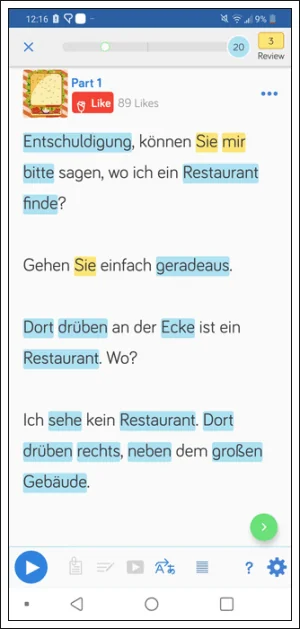The Accusative Case in German: Know it When You See It
Every learner of German picks up real fast the idea that there are four cases.
But it takes some of them a lot longer to understand what the cases mean and how to use them accurately.
Today we’ll be looking at the accusative case in German – in my opinion, one of the simplest cases in the language. Ti be honest, I’m going to have to deal with a grammatical case, I’m always hoping it’s the accusative 😉

The accusative case in German
Think about the word “accuse” for a moment. There’s got to be two parties involved – the accuser and the accusee. And something is happening between them. There’s an invisible thing flying in one direction: the accusation.
The accusative case in any language marks the recipient of some action. It’s also known as the direct object.
Let’s have a look at how that works in some extremely simple sentences.
Ich sehe dich.
I see you.
Du siehst mich.
You see me.
Das ist ein Stift.
That is a pen.
Sie hat einen Stift.
She has a pen.
Everything in bold is changed from its original, or “nominative” form to mark the accusative case.
You’ll note that “I” and “me” have the same base meaning in the English examples, and yet “me” is used when the accusative “mich” appears in German. That’s exactly the same phenomenon. English used to mark all its words like German does, but over time this practice died out and it’s only the pronoun cases that are left.
So that covers the usage of the accusative to mark the direct object.
One other usage is with prepositions. Again, think about English – it would sound pretty strange to say “under he” or “about she.” Prepositions in German change the case of the word, just like in English.
In fact every German preposition takes a case other than the nominative. Here’s a quick list of the German accusative prepositions:
durch through durch den Wald (through the forest)
für for für dich (for you)
gegen against gegen den Feind (against the enemy)
ohne without ohne meinen Sessel (without my armchair)
um around/about um den Berg (around the mountain)
bis until/up to bis seinen Tod (until his death)
One other type is two-way prepositions, which can take either the accusative or the dative. Let’s have the list first and then explain how this works.
Whenever the preposition is describing motion or a new state, it takes accusative. When the preposition is describing a single location, it takes dative. It’s an unusual distinction to wrap your head around, but once you get a handle on the concept it becomes pretty natural to think that way.
This preposition business is a lot to think about, I know. But it turns out the best way to learn the prepositions and their cases is also the best way to learn the accusative case – or any new grammatical feature, for that matter.
You need to do some close reading of texts and pick out all the times the accusative case is used. So if you see a sentence like this:
Ich habe so viel Geld verdient, dass ich nun einen sorglosen Ruhestand genießen kann.
I’ve earned so much money that I can now enjoy a carefree retirement.
…then make yourself some notes that look like this:
verdienen (accusative) = to earn
Geld verdienen = to earn money
genießen (accusative) = to enjoy
(einen) Ruhestand genießen = to enjoy (a) retirement
After only a few intense study sessions like that, you’ll start to pick up these patterns very naturally. German is more explicit about marking its grammar than English, so you need to pay extra attention or you’ll just gloss over it and never internalize the differences.
Content over grammar, the LingQ way
Whether you’re learning the accusative case in German, or any other grammatical topic, I recommend reading content you enjoy rather than strictly studying textbooks and trying to remember the rules. You’re already learning a new language, remembering rules on top of that is going to be…tough. And regardless of how well you try to remember each rule, you’re still going to make mistakes! So why not learn using content you enjoy? The more you read, the more you’ll start to recognize patterns and how the language works 🙂
LingQ has thousands of hours of content for you to read and listen to, from beginner material to advanced.

Not only that, but you can also import your favorite German content into LingQ and create interactive lessons. For example, you can import YouTube videos, music, video, and much more.
Using LingQ, you can keep all your favorite German content stored in one platform, easily look up new words, save vocabulary, and review them for later. Check out LingQ today to discover how to learn German from content you love!
LingQ is available for both Android and iOS so you can study anytime, anywhere. Give it a try today and join tens of thousands of other language learners and discover new content, share ideas, and much more.
Learning German? Check out our German grammar guide on LingQ!
***
Author Bio: Alex Thomas is a teacher and writer living in China. He studied German and Linguistics at university and still finds a way to use both every day.


